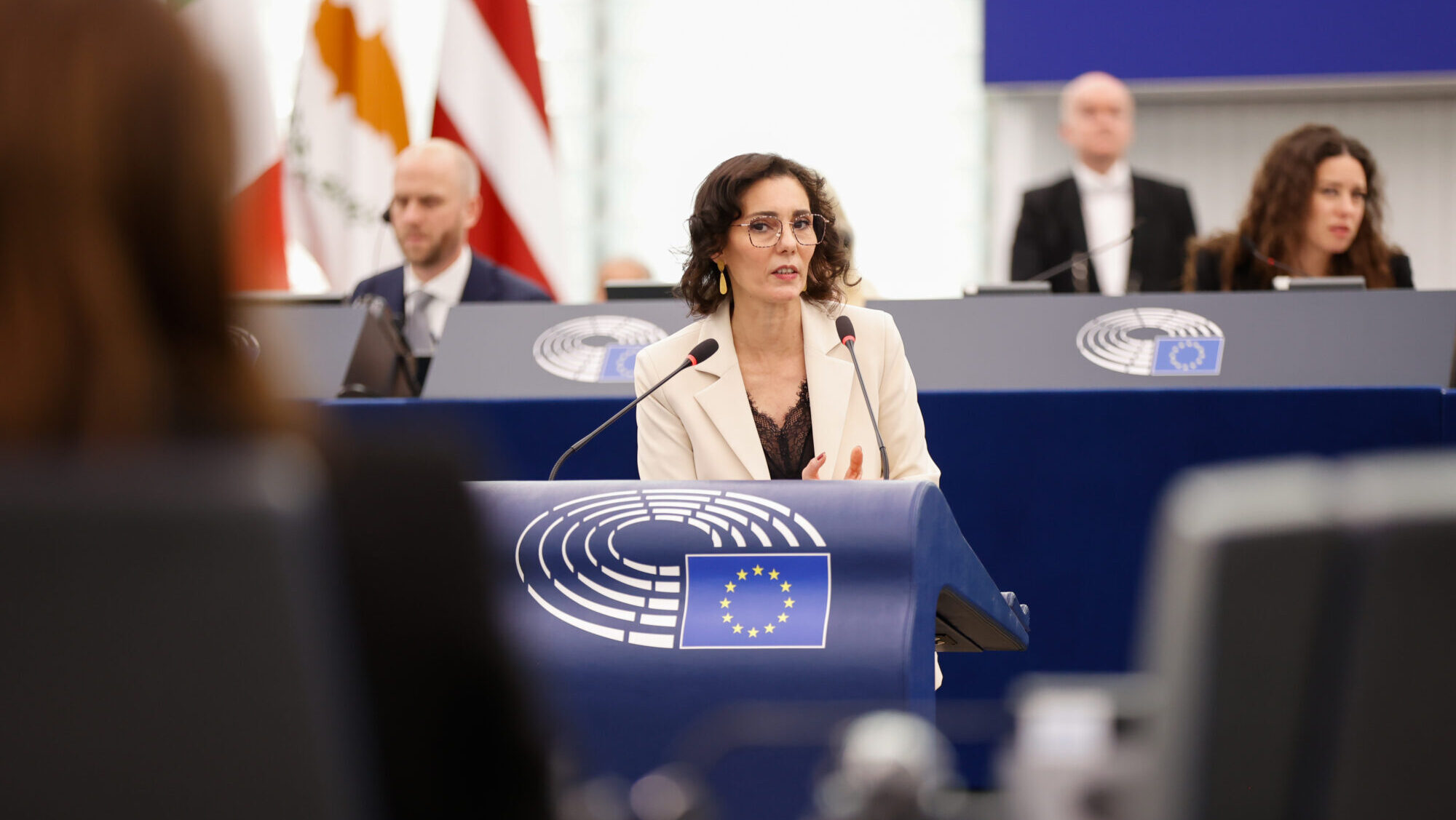
Hadja Lahbib, European Commissioner for Equality, Preparedness and Crisis Management
Photo: Mathieu CUGNOT © European Union 2025 – Source : EP
A tense debate in the European Parliament in Strasbourg on February 12th over U.S. President Donald Trump’s foreign policy has exposed the deep division within the European Union on key issues such as climate change, healthcare cooperation, and humanitarian aid. Trump’s decision to withdraw the United States from the Paris Agreement, quit the World Health Organization (WHO), and dismantle the United States Agency for International Development (USAID) has caused a clash in Strasbourg between defenders of multilateralism and those advocating for a policy based on national sovereignty and budgetary efficiency.
Hadja Lahbib, European Commissioner for Crisis Management, opened the debate by introducing the EU Commission’s official stance. “International cooperation is our greatest ally,” she stated, lamenting the U.S. withdrawal from the Paris Agreement and arguing that “American leadership in decarbonization is fundamental to achieving environmental goals.” She also expressed concerns over the U.S. exit from the WHO, emphasizing that “pandemics know no borders, and the WHO remains a key player in international health cooperation.” Regarding USAID, she warned of the risks of its dismantling and the possibility that “actors with interests opposed to the West will fill the void left by the American agency.”
USAID is an agency that has funded projects in over 120 countries in areas such as health, education, and economic development. While its defenders argue that it plays a crucial role in global stability, the Trump administration has maintained that “it is an inefficient bureaucratic structure” used to influence the political systems of other countries under the pretext of humanitarian aid. It has been documented that USAID has funded media outlets and NGOs in strategic regions, raising accusations of interference in internal affairs. In countries like Ukraine, up to 90% of the media depend on its funding, raising serious concerns about editorial independence and the manipulation of information in favor of U.S. interests.
In other words, almost all media outlets in Ukraine operate with U.S. funds, shedding light on the country’s situation in recent years, particularly since 2014, the year of the so-called ‘Maidan Revolution,’ which marked Kyiv’s protection under Washington’s umbrella. The Maidan protests, supported by the United States, arose in response to President Viktor Yanukovych’s decision to not sign a free trade and political alliance agreement with the EU and resulted in the ousting of the democratically elected president amid accusations of him being “pro-Russian.”
According to a report by Reporters Without Borders (RSF), in 2023, USAID financed the training and support of more than 6,200 journalists, backed 707 non-state media outlets, and supported 279 civil society organizations dedicated to strengthening ‘independent’ media in over 30 countries.
European political groups’ stances revealed the EU’s ideological divide on these issues. The European People’s Party (EPP) adopted a cautious approach, emphasizing the importance of preventing the rise of authoritarian regimes and suggesting that “the Munich Security Conference (February 14–16) could be an opportunity to foster strategic dialogue with Washington.” While they acknowledged the challenges of Trump’s policies, they avoided outright condemnation, opting for a pragmatic stance that seeks to keep diplomatic channels open.
On the left, the Socialists & Democrats (S&D) group attacked Trump, warning that “when the U.S. slows down, China speeds up” and that his withdrawal from the Paris Agreement directly benefited China, which has capitalized on the gap left by the U.S. to lead the renewable energy sector. For them, Trump’s stance represents “a setback in the climate fight and a missed opportunity for the U.S. in the green technology race.” From Renew Europe and the Greens, criticism was even harsher, with Renew calling Trump’s decision “part of Mr. Trump’s authoritarianism.” At the same time, the Greens stated that “his policies remind us of playground bullies.”
On the other side of the aisle, conservative and sovereigntist groups defended the need to rethink the globalist policies imposed by the EU. The Patriots emphasized the need for “massively investing in nuclear fusion as an alternative to the current decarbonization model.” ECR questioned the notion that “decarbonization should be a religion to which the EU adheres unconditionally,” warning that “countries like China, India, Argentina, and Indonesia will likely follow Trump’s path.” In a more direct tone, the Europe of Sovereign Nations (ESN) group ultimately rejected the Paris Agreement and the WHO, arguing that “we must change this falsehood of climate change and stop wasting money on the WHO to manipulate public opinion.” They also denounced the WHO as “a tool of manipulation” and defended ending humanitarian aid managed by USAID, calling it “a political pressure mechanism that does not serve national interests.”
The U.S. withdrawal from these international organizations can be interpreted as a legitimate attempt to regain control over its resources and define its priorities without being conditioned by supranational structures often imposing ideological agendas disconnected from national interests. In addition, the data revealed by the Trump administration demonstrates how the world’s leading power had interfered globally through humanitarian and development aid programs under the previous government. The dismantling of USAID and leaving the WHO, and the Paris Agreement represent “an approach based on sovereignty and efficiency,” as opposed to the bureaucracy and obligations imposed by multilateral organizations, which, in many cases, have proven ineffective or even counterproductive for Western economies, several MEPs pointed out.
The debate in the European Parliament has highlighted that the EU stands at a crossroads: it either continues down the road of multilateralism and insists on leadership in the global climate and health agenda, or it realizes the risks of a model prioritizing political correctness over economic and geopolitical reality, and changes course. What is at stake is not only the future of transatlantic relations but also the EU’s ability to define an independent strategic direction that does not rely exclusively on Washington or international organizations’ will.
